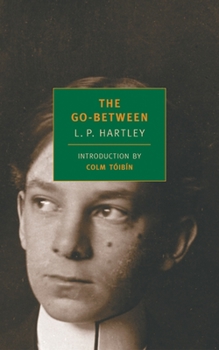The Go-Between
Select Format
Select Condition 
Book Overview
The moving exploration of a young boy's loss of innocence 'The past is a foreign country: they do things differently there...' When one long, hot summer, young Leo is staying with a school-friend at... This description may be from another edition of this product.
Format:Paperback
Language:English
ISBN:0940322994
ISBN13:9780940322998
Release Date:March 2002
Publisher:New York Review of Books
Length:344 Pages
Weight:0.80 lbs.
Dimensions:0.9" x 5.0" x 8.0"
Customer Reviews
3 ratings
Wistful, chaste, and utterly captivating.
Published by Thriftbooks.com User , 21 years ago
Resembling both McEwan's Atonement and Frayn's Spies in its plot, this 1953 novel, recently reprinted, tells of a pre-adolescent's naive meddling in the love lives of elders, with disastrous results. Set in the summer of 1900, when the hopes and dreams for the century were as yet untarnished by two world wars and subsequent horrors, this novel is quietly elegant in style, its emotional upheavals restrained, and its 12-year-old main character, Leo Colston, so earnest, hopeful, and curious about life that the reader cannot help but be moved by his innocence. Leo's summer visit to a friend at Brandham Hall introduces him to the landed gentry, the privileges they have assumed, and the strict social behaviors which guide their everyday lives. Bored and wanting to be helpful when his friend falls ill, Leo agrees to be a messenger carrying letters between Marian, his host's sister, and Ted Burgess, her secret love, a farmer living nearby. Catastrophe is inevitable--and devastating to Leo. In descriptive and nuanced prose, Hartley evokes the heat of summer and the emotional conflicts it heightens, the intensity rising along with the temperature. Magic spells, creatures of the zodiac, and mythology create an overlay of (chaste) paganism for Leo's perceptions, while widening the scope of Hartley's focus and providing innumerable parallels and symbols for the reader. The emotional impact of the climax is tremendous, heightened by the author's use of three perspectives--Leo Colston as a man in his 60's, permanently damaged by events when he was 12; Leo as a 12-year-old, wrestling with new issues of class, social obligation, friendship, morality, and love, while inadvertently causing a disaster; and the reader himself, for whom hindsight and knowledge of history create powerful ironies as he views these events and the way of life they represent. Some readers have commented on Leo's unrealistic innocence in matters of sex, even as a 12-year-old, but this may be a function of age. For those of us who can remember life without TV and the computer, it is not so far-fetched to imagine a life in which "mass communication" meant the telegraph and in which "spooning" was an adults-only secret! Mary Whipple
The end of a golden summer
Published by Thriftbooks.com User , 23 years ago
This book is striking as a counterpoint to Evelyn Waugh's masterpiece "Brideshead Revisited". Both were written immediately after WW2, when Englishmen, exhausted, quite reasonably gazed back at a lost time of grace and innocence.Both Hartley and Waugh saw the falseness of that innocence, but also its deeper truth.Hartley's story is worth reading now, at the beginning of this century, for he places it at the dawn of the last one. Leo, his protagonist, is 12 years old. He has huge dreams for the century that is breaking on him. His faith contrasts with the bitter weariness of his older self, the alternative narrator, who in 1950 lays out this story from his memory, prompted by the discovery of a childhood diary."Has the 20th Century done so much better than I have?" the narrator chides the memory of his childhood self. "You were vanquished, and so was your century, your precious century that you hoped so much of."1900 was the last hot summer of Victoria's England. Leo, the only child of a widowed mother, goes to stay with a much wealthier schoolfriend. He sees nothing but the glories of the Maudsley family and their special guest, the Boer war-scarred young nobleman Viscount Trimingham. He becomes enraptured in his friend's sister, the ethereal Marian, for whom he would happily die.In an emotional sense, he will.Marian is kind to Leo. She also uses him. How much her affection was false, how much was genuine, lies at the core of Leo's agony. The boy acts as a go-between in Marian's illicit love for a tenant farmer, a man of physical force, a creation worthy of DH Lawrence. Leo learns that adults are not what they seem. And he takes it hard.It is possible to quibble with this story. It stretches credulity that even a century ago, a boy on the brink of puberty could be quite so naive - or that the loss of innocence should bring so complete an emotional collapse. The young Leo seems too vulnerable, the older one, too stifled. What holds it, though, is the beauty of the writing, the evocation of a lost age - both the age of boyhood and the age when Class, with its immutable threads, bound every English soul to its own orbit. Two world wars, for better or worse, blew such certainties apart.The story lives up to the mystery and the promise of its rightly famous opening line, the haunting and teasing truth: "The past is a foreign country: they do things differently there."
The Go Between a young boy whose life is forever compromise
Published by Thriftbooks.com User , 24 years ago
When you start to this read the novel you may, initially, be overwhelmed by the elder Leo's adult persecptive. Do not let that put you off this tremendous novel. The author uses a Dickensian technique to allow the aged narrator to build a narrative full of suspense and drama. The Young Leo is exploited by adults who ought to know better...The most marvellous aspect of this book is L.P. Hartley's writing which is perfectly tuned. You cannot read this novel without becoming embroiled in young Leo's dilemna.





